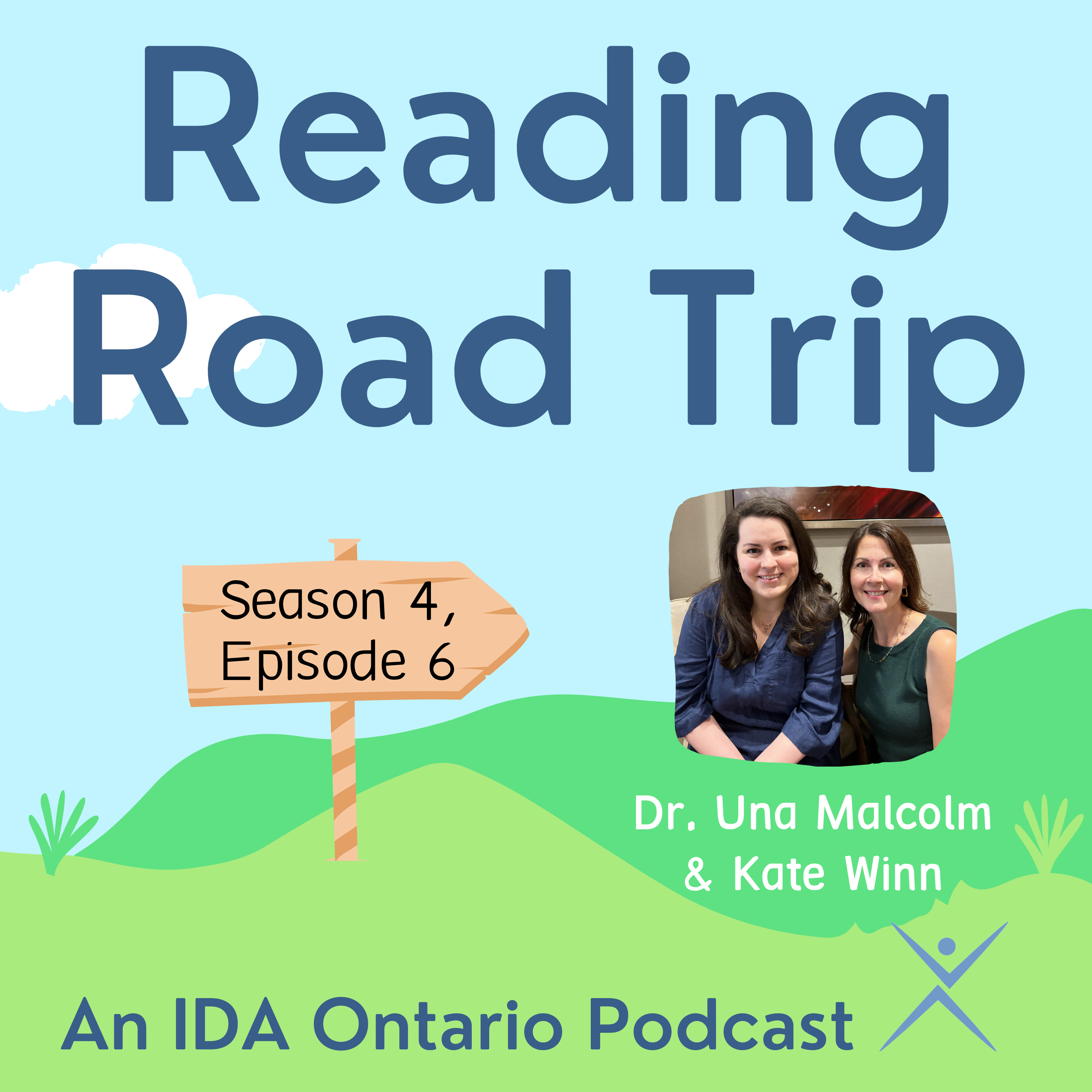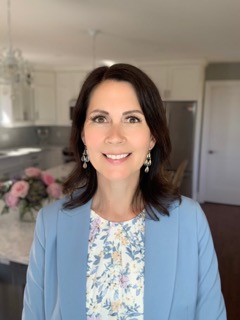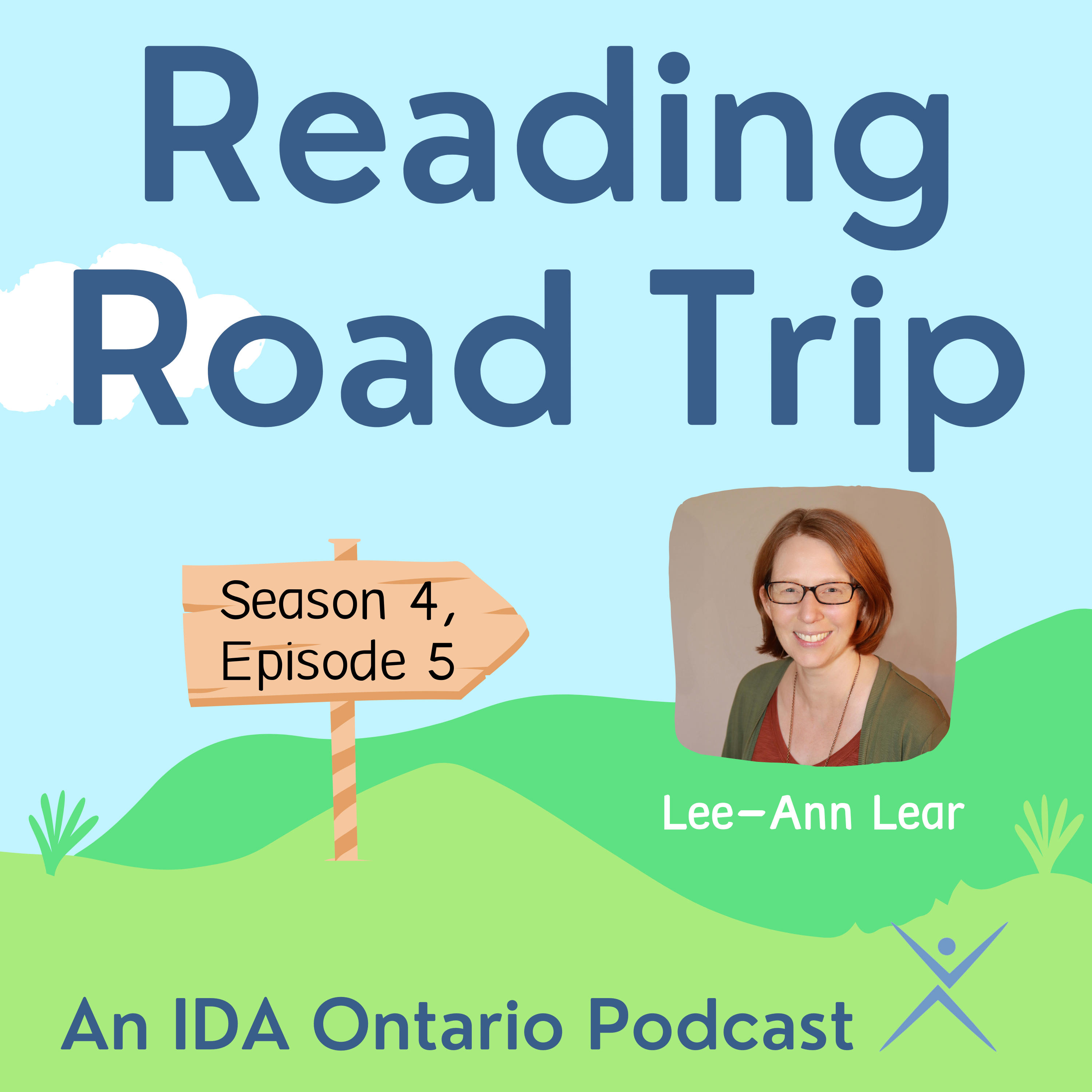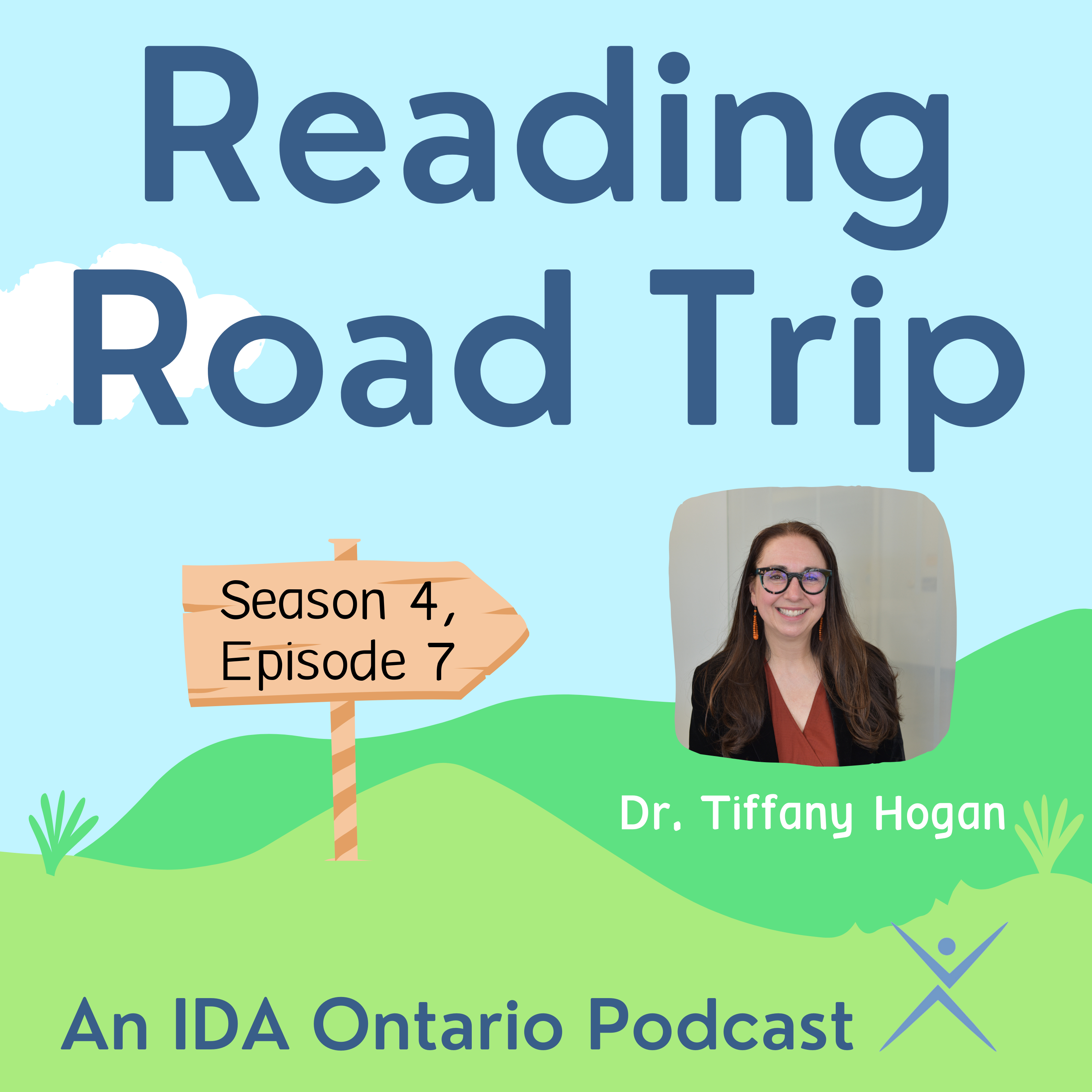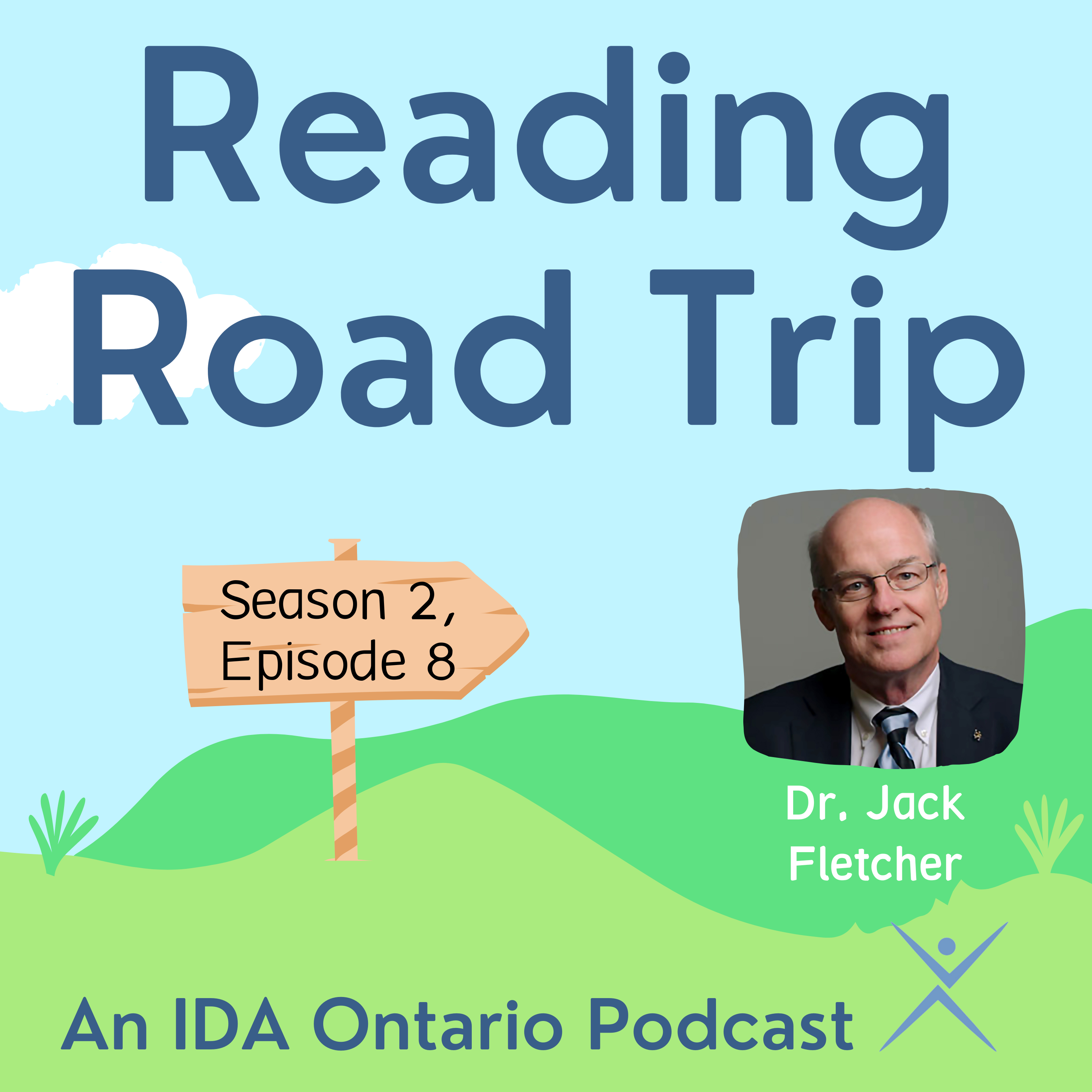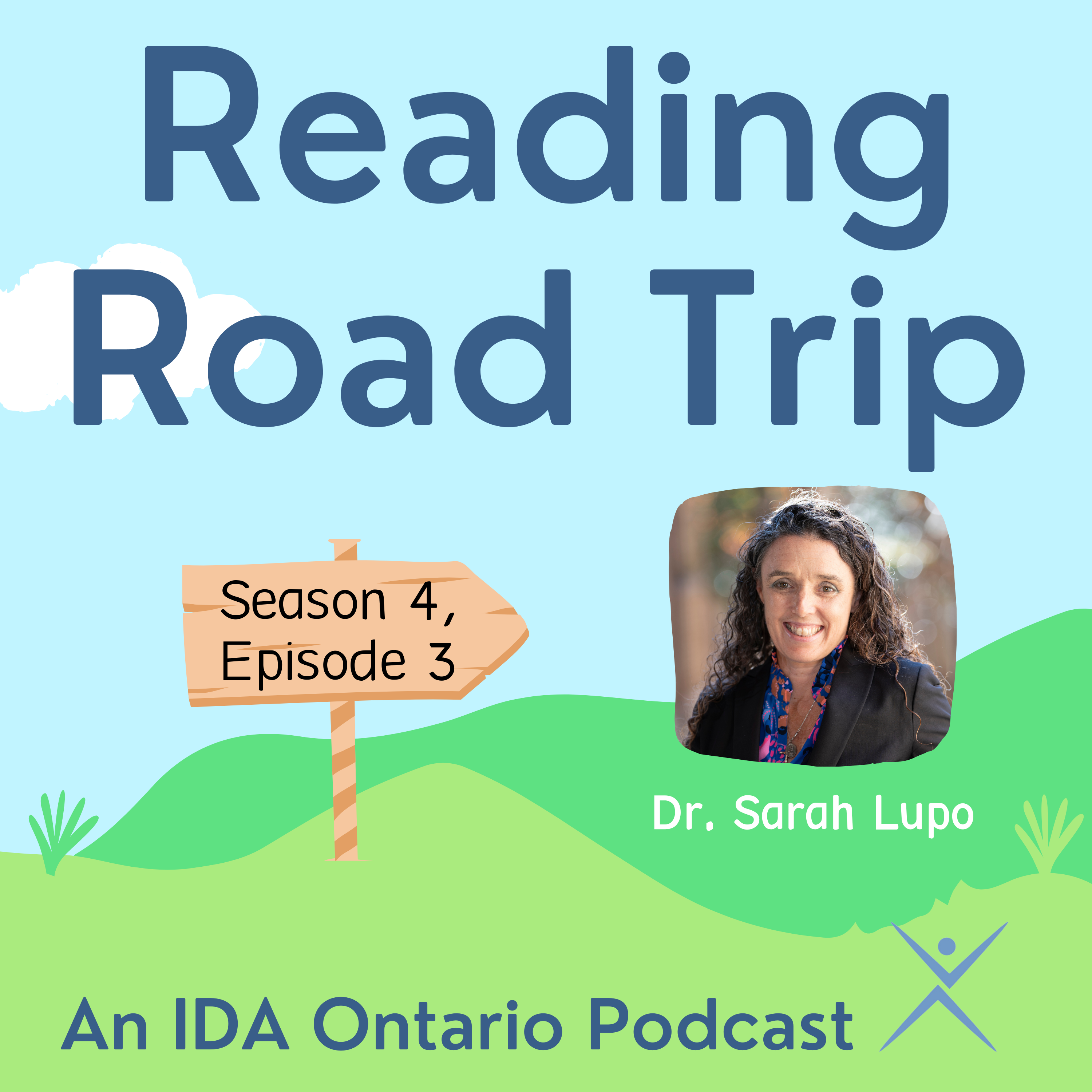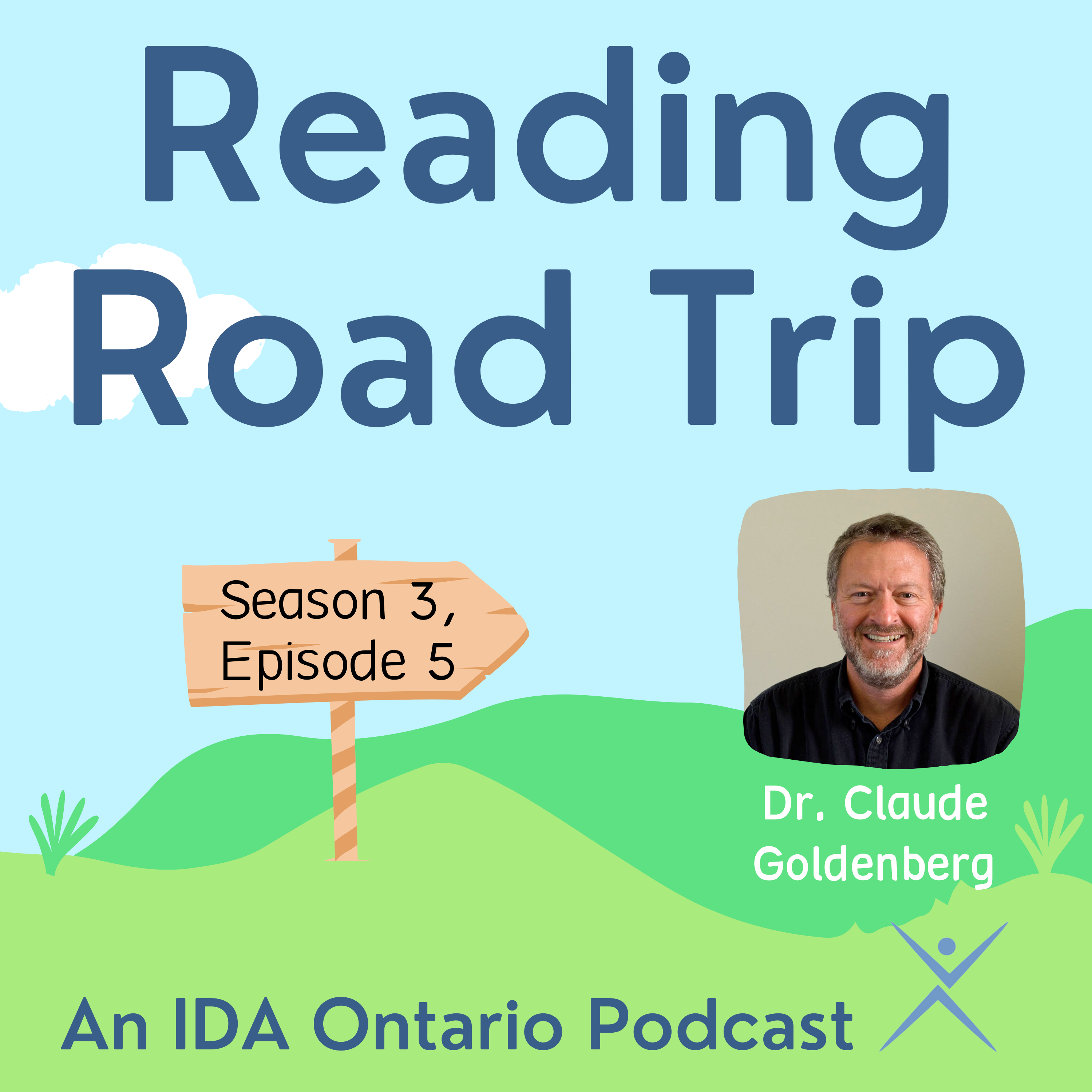Episode Transcript
[00:00:04] Kate Winn: Hello to all you travellers out there on the road to evidence-based literacy instruction. I'm Kate Winn, classroom teacher and host of IDA Ontario's podcast, Reading Road Trip. Welcome to the sixth episode of season four.
Before we get started, we would like to acknowledge that we are recording this podcast from the traditional land of the Mississauga Anishinaabe. We are grateful to live here and thank the generations of First Nations people for their care for and teachings about the Earth. We also recognize the contributions of Métis, Inuit and other Indigenous peoples in shaping our community and country.
Along with this acknowledgment and in the spirit of truth and reconciliation, we'd like to amplify the work of Indigenous artists. And today we are sharing the picture book What Is Your Name? A book about Inuit naming practices.
And this book was written by Kukik Kusugak, Seth Naullaq Benjamin Arreak, Panigusiq Obed and Dominic Tegeapak, and illustrated by Amiel Sandland.
[00:01:11] Kate Winn: Does your name have a story? The characters in this book have stories behind their names, too.
Naming is an important practice to Inuit. This book follows four Inuit children as they explain the meanings of their names in simple language for young children to enjoy. Add this title to your home or classroom library today. I know at the start of the school year, often teachers will have a focus on names in the classroom. So this would be a lovely book to include with that.
And now on with the show.
[00:01:43] Kate Winn: I’m really excited to introduce the guest this week here on Reading roadtrip who actually isn't so much a guest as a integral member, an integral member of the team who is the co-producer here at Reading Road Trip, Dr. Una Malcolm. Welcome to the show this week, Una.
[00:01:59] Una Malcolm: Hi Kate. Thanks for the invite.
[00:02:02] Kate Winn: So Una and I are doing an episode this week to share with you.
[00:02:06] Kate Winn: Some of our takeaways and highlights from.
[00:02:08] Kate Winn: A conference that we recently attended. The conference and I recently learned also when I look at it on paper, I kept saying SSSR, but Una very kindly one time corrected me and just kind of said, oh, you mean Triple SR. So it is called the SSSR conference.
But before we dig into all of these highlights and takeaways, Una, could you just let our listeners know in case they're not aware, what is sssr?
[00:02:34] Una Malcolm: Sure. So SSSR an acronym. We sure love acronyms in education, but it stands for the Society for the Scientific Study of Reading. And this is a professional organization for researchers. I think it was formed in the 90s or so, and really the efforts of this organization are to promote sort of the scientific study of reading and then sharing and disseminating that information.
They do that in two main ways. Number one is through a journal which is also called Scientific Studies of Research. So it's a, sorry, Scientific Studies of Reading, which is a peer-reviewed journal that publishes research. And then also through an annual meeting or a conference, which is what you and I had the delight of participating in last week, where researchers from all across the world come and present their work amongst that community. So, so that's really the focus of that, of that conference.
[00:03:26] Kate Winn: Thank you so much.
[00:03:27] Kate Winn: So we each have three takeaways that we're going to share. In the middle, we have a really special segment to share with listeners too, but we will get to that in a bit.
[00:03:35] Kate Winn: The first takeaway that I wanted to share from this conference, so it was held in Calgary, Alberta this year. And when I found that out about a year ago, I thought, okay, this year it's in Canada because it's always international, you know, locations. So I thought if it's in Canada for 2025, I will go. And I have never actually been to Alberta at all. So it was a great opportunity to, to do that traveling and my husband came with me. So the first really real takeaway that I had was just how vast research is.
So I went on the first day of the conference. There was a practitioner day that I'll talk about in a bit and then the actual conference itself for researchers was a three-day conference. And of course like research is vast, but even the idea of reading research, how many different topics were in there? So the format of the conference generally was there were some presentations which were usually research speaking to papers that they'd written, studies that they had done, kind of gathered around a topic and so sometimes they called it a symposium and there was somebody who at the end kind of did a bit of a summary or questions about those papers, that sort of thing. Or sometimes it was just, you know, four or five separate papers that were presented on a general theme. But even I found the general themes could be pretty broad.
And then there were poster sessions as well, which you and I were joking was kind of like science fair where they were just all set up in a big room and you could just walk up and down the aisles and have researchers speak to you, you again, about projects that they had done that were sort of presented in poster form. So so much there.
But I just to give it an idea of some of the sessions I attended, so I did one on shared book reading. So again, five different papers were presented that all kind of fit in that theme. A couple of interesting things I found in that one, they were talking about parent surveys on, for this example, on whether or not they read to their kids. And so the, the researcher was saying that, you know, and I don't think it's just parents. I think anybody, when they're responding to surveys, they often give the answer that they think they're expected to give. So talking, for example, about a parent survey where 100% of the parents said that they read to their children daily.
But then when they participated in some of the pieces of the study, and it was done digitally, and so it was very clear they had the analytics to track it, what a small percentage actually were doing it, that sort of thing. And then they talked about ways of tweaking surveys. So instead of saying, how often do you read to your child or do you read to your child daily, yes or no, they made all these profiles. This parent does this and believes this and lets their child do this, and this one lets them do this, this, this. And then the survey respondents had to pick which profile, you know, they liked better or better reflected them and that sort of thing. So just ways to even tweak surveys, like things I had never even thought about, of course, because I'm not a researcher. They were talking about interactive features of digital stories. This was a different study and how those features may or may not improve comprehension for students. And it was just so interesting. Like, if they did it this way, this comprehension was impacted, and if they did it this way, it wasn't.
There was another one on whether presenting information in a book, a video, or both, which they were calling synergy, could improve topic knowledge for students. They were talking about that. So again, like, that was just all within the one presentation about shared book reading. I went to one on reading instruction, another one on instructional practice, reading anxiety, reading motivation.
A really neat point for reading motivation. So we know, of course, that skill impacts motivation. So 100% that that piece is there. But another, you know, tidbit found in, in one piece of research was that the finding the right book moment was impactful for motivation of students with dyslexia and less so that was less important for the better readers who seem to be more motivated from the start, but the weaker readers, of course, you know, building their skill and making them stronger readers increases their motivation, but another piece that helped was that finding the right book moment. So just kind of gives us a tidbit of, you know, making sure we're trying to help students find the books that will engage them and motivate them, too. And then other topics that I didn't attend, I mean, there were things you attended because they're, you know, relevant to the work you do, but there were even things on, like eye movements, you know, so you could go and watch five presentations, all that had to do with eye movements, acquiring literacy in standard Arabic, home literacy, so all sorts of different things. So I tried to pick the ones that I thought would apply most to my interests, or also what I actually do for my work.
White matter microstructure. Did you go to white matter microstructure?
[00:08:06] Una Malcolm: I didn't, but actually I was just reflecting. Did we go to any talks, any of the same talks? I think we might have been in different.
[00:08:14] Kate Winn: I, I don't know. I don't think we did. No. We picked too much and sometimes I think we were a bit deliberate. Let's, you go this way, you go this way so that we can catch up. But no, I think we both had different interests. So it, it's great that it could appeal to me, appeal to you, Appeal to people who want to know about the white matter microstructure and the eye movements.
But yeah, so I think that was just my first takeaway, was just. Yes, of course, research is vast, but reading research itself, how vast that is. What was the first thing you took away, Una?
[00:08:46] Una Malcolm: Well, Kate, you're going to smile because my first takeaway was essentially that exact point.
It really is something where I was reflecting back on the breadth and the depth of the talks and of the poster sessions that we got to experience and got to learn from.
And it just to take your point and to just pull on it a little bit, it really makes me connect back to that common, you know, that common complaint or criticism that the science of reading is just phonics or it's just about word recognition. And I think about how, you know, when we think about the science of reading, there's often misconceptions that it's the instruction or, you know, we sometimes have a bit of a mixed up take on what that is, knowing that when we're referring to that term, the science of reading, it is that research. It's that body of research.
We got a front row seat to that last week. And to your point, absolutely. There was an incredible range of different topics from people all across the world speaking different languages, researching literacy and language and literacy development in languages with different scripts, different orthographies.
To your point, yes, eye movement, neuroimaging talks and posters, ones that focused on teacher knowledge, right, I went to a couple of those talks at the really interesting for me, things about, you know, instructional research, intervention, morphology, measurement and assessment creation. Right. How are new measurements created and how are they validated and how does that connect to research and practice? So I think about the topics that are so broad, but then I also think about the methodologies. right. I think about how, and I'm imagining you probably found the same. But you know, you could be in one talk that was an intervention focused one that was working with kids and teachers and was directly applied in school practice. But that next talk could be something more correlational that's doing some modeling and talking about predicting and what predicts what in terms of skill development.
There were some mixed methods and qualitative papers. There were surveys. It was really, really interesting just to see all those different topics examined in such different ways as well. And it really just helped me walk away with that reminder of oh my goodness, it is such a brilliant, broad, complicated field and it is so, so, so much more than just phonics and word reading.
[00:11:01] Kate Winn: That is for sure. Thanks.
The second thing I wanted to share that I took away, that I'm ready to admit is that I am clearly a practitioner, not a researcher.
So on Wednesday, the first day pre-conference, I guess you would say it was a practitioner day. So practitioners from around the Calgary area or whoever wanted to travel in were invited to come to this. This had five of the researchers who would be participating in the rest of SSSR. They had them there a day early to present. So when I say practitioners, lots of teachers, educators, but also speech language pathologists, people like that who are involved with, with students.
So the people who presented, Matt Burns presented on assessment, Devin Kearns on polysyllabic words. Very interesting. One of the things I noted, he always says polysyllabic instead of multi syllabic. And he explained that because syllable comes from Greek, then he wants to use the prefix poli which also comes from Greek. That's what he decided when he first started writing about this. He thought okay, what word am I going to use in my papers? And that sort of thing. So he decided to go with morphology to go with the Greek prefix that would go with with the Greek word. So that's why he -
[00:12:14] Una Malcolm: Sorry to interrupt - I'm glad you brought that up. I saw that you posted about that and I meant to ask you, I meant to follow up, but clearly I missed that.
[00:12:19] Kate Winn: Yes, he's totally fine with people saying multisyllabic, but that was just his rationale for why he says polysyllabic. Interesting he how he doesn't think that there's research to support the necessity of teaching syllable types.
If you do it and it works, that's fine. He's not saying there's a reason to stop, but he and his, his colleagues, they like to recommend ESHALOV, another acronym which means every syllable has at least one vowel. That's more of the rule that they like to make sure that kids know. Suzanne Adloff talked about screening for oral language, which is, you know, so interesting. We've done so much more, I think, on the word reading assessments in terms of screening and so on. So she talked about that. Something interesting she was talking about in terms of choosing a screener. She had a little chart and she said cost. And of course we all think of financial cost, like what does this cost? We use Acadience, which you can use for free for our word reading screening.
And so obviously you want to think about that. But she also had said, but also consider the costs associated with false positives and false negatives if you have a screener that that isn't as accurate. Right. And so that's, you know, kind of got me thinking. Yeah, what are the, and sometimes there are financial costs associated with that, but also the costs, the cost of missing students who may need extra support, the wasted resources on flagging students who don't actually need extra support. So I thought that was an interesting one. Hugh Catts on reading comprehension, I love his stuff. And just all of the, the big picture things about like how comprehending reading is one of the most complex things we ever do and it's not as, you know, as simple as some people make it out to be. And Nicole Patton Terry, she talked about, hers was called Helping the Science Ensure Success for All Learners. And sort of that all piece as a key focus, she showed something neat called the Active Implementation Formula and the three factors in that: effective practices, effective implementation and enabling context.
So that piece too, right? You might have the practices, you might have the implementation. But that context piece, which I thought was interesting, then there was a panel discussion at the end of the day, and what I noticed, of course, because Dr. Stephanie Stollar and I have just recently submitted our manuscript for our book, which is coming in January, Reading Assessment Done Right.
So many questions on assessment. Practitioners have so many questions. So I mean, Matt Burns talked about assessments, Suzanne Adlof talked about screening. So that topic had come up, but proportionally most of the questions were assessment, which just really tells me that educators have questions about that.
One thing Matt Burns said at the end during that panel discussion was that as practitioners, we've done a really good job moving, you know, bringing the science of reading into our classrooms instructionally. Like, a lot has happened, there's been a lot of movement. But just to quote him, he said assessment is behind the times when it comes to the science. So he was kind of calling on practitioners, and, I mean, he did a great job because we were in Alberta going through examples of approved screeners for Alberta and which ones he would actually recommend or not recommend and that sort of thing just to, you know, kind of move educators in, in the right direction with that. Another neat thing that came up in the panel discussion talking about equity, and somebody asked about ChatGPT, and, you know, did the panellists think that maybe that would, could improve equity? Is there something that could be, you know, a positive out of that? But Nicole Patton Terry made a really great point that it might in some ways, but it also might not because you still need language ability to know what to prompt ChatGPT, and you also need to be able to be a critical consumer of the results that you get. Right. So while some people might think it levels the playing field in certain ways, actually, in some ways it, it still won't, which was, which was interesting. But I just thought, you know, the practitioner day seemed really relevant to me as a practitioner. And then, I'm not going to lie, the other days, a lot of it was really heavy for me.
A lot of it was, and I mean, you can tell, too, with researchers. They were presenting to researchers, so they weren't supposed to have slides that were accessible to me or engaging for me, right, they were engaging with other researchers, but you could almost tell sometimes with some that maybe they were more used to simplifying them a little bit for an audience. Like, you know, in terms of even the visuals on slides. Like, sometimes I would see graphs and numbers, and I would think, oh, dear heavens, I have absolutely no idea what any of this means. I know I was looking at the, the agenda, and there was supposed to be one spoken paper session on assessment, and I thought, well, yeah, check, I'm gonna go to that one. But then when I actually looked at the breakdown on the five papers that were being presented, I was like, oh, no, no, no, I do not want to go to, like, all about methods and the stats and theory, you know.
[00:17:07] Una Malcolm: Item response theory, right, yeah.
[00:17:07] Kate Winn: No. And even when we were at dinner and I said to you and our dinner companion, okay, explain regression to me, please, because that had been a big feature in something that I had seen that day. So, you know, it was very clear to me. I am a practitioner, I am not a researcher. One session that was for researchers that I actually found really relatable was the last session on the last day was Holly Lane. And hers was called Effectiveness and Usability of UFLI Foundations, which of course was speaking my language, because that is the foundational skills program that I use in my class. But I also felt like the slides she used, she's very accustomed to presenting to practitioners as well.
So I found a lot of her slides. I mean, of course, it's research. You need data, you need the numbers, you need that information on there. But even just to visually present them in a way that you don't necessarily have to have multiple degrees to understand what the results of something were.
[00:17:57] Una Malcolm: Right.
[00:17:58] Kate Winn: So on that note, I don't think I would go back to SSSR again. I mean, if it was ever in Canada again, maybe I would have to.
Now they talked about maybe there would be a Practitioner Day next year. But is it, is it Denmark next year or Netherlands?
[00:18:13] Una Malcolm: I think Rotterdam.
[00:18:15] Kate Winn: Okay, okay. Because it was one place year. One place next year. Yeah. Okay. So I won't be going there now. In Calgary, they were talking about, oh, it was, the Practitioner Day was so great, maybe we'll do another Calgary Practitioner Day at some point, which I don't know that I would fly to Calgary for that either, even though it was really, really good. But I also think it was easier to get those five esteemed researchers in there to do a day when it was just the day before a research conference that they were already going to be attending, right, so I will definitely continue to do all of the professional development that I do because I love it, but I think I would, I don't want anybody hearing this like a classroom teacher thinking, oh, my gosh, I totally have to go to Rotterdam next year, because I'm not sure that it's, you know, all entirely applicable, but still a great experience.
But, yeah, I think that to sum all of that up, I'm very clear that I am a practitioner, not a researcher.
Now, before we go to your second takeaway, we have a special little segment that we want to put in here for our listeners. Una, could you just set that up for them?
[00:19:16] Una Malcolm: Certainly can. So Kate and I are chatting about the SSSR Conference, but way back in April, IDA Ontario hosted its 15th, I should know that. 13th, 14th. We've had many conferences. We hosted one in April, and we were really trying to think of a way to pull in Reading Road Trip into that conference. And we thought a fun way of doing that, we have as part of our app, we have a scavenger hunt where attendees can do all sorts of wonderful tasks and compete for fabulous prizes. And we thought a fun thing might be to seek out some perspectives from some of our Reading Road Trip listeners. So we invited conference-goers to give us a call at IDA Ontario and to leave us a really brief voicemail with some of their favourite structured literacy teaching tips. And then we had so many fabulous submissions that we thought we'd keep it open a little bit longer after the fact. So we did seek out some callers after the fact, and it really was just such a treat to be able to listen to all of them. These are tips coming from practicing educators in terms of things that they have tried in their classrooms that they felt have been impactful for their students.
So we listened to all of them. It was wonderful to hear that, we can't share all of them with you, so thank you, if you were one who submitted your tip, we appreciate that so much. But we're just going to highlight a couple of gems that we thought were really fabulous, and we'll add them to the podcast here.
[00:20:35] Speaker D: Hi there. My name is Kayleigh, and one strategy that's super simple that I'm implementing this year has been to have my students respond chorally or have everyone respond, moving away from students, raising their hands. And it's just been a great way for my kiddos to be able to have more opportunities to respond and engage in my lessons.
Hi, my name is Rachel, and my best tip is for kindergarten, and after you do a read aloud, doing a specific small group where we are segmenting some of those keywords from the read aloud, and you're doing that in a guided practice. I love to use my little magnetic word boards to help them really segment the phonemes from the word.
Hi, this is Stephanie, and the top literacy strategy I like to use with intervention groups is phoneme grapheme mapping with chips with sky grass ground paper. Thanks, Bye.
[00:21:31] Kate Winn: Okay, that was super fun to hear all of those tips. What a neat idea. And thank you again to all of the listeners who submitted their structured literacy tips. Great.
We're going to go back to our takeaways from the SSSR conference that was held recently in Calgary. And I've got Una Malcolm here with me, and Una, you are now going to share your second takeaway.
[00:21:55] Una Malcolm: Well, actually, Kate, I do have to smile because I think a lot of our takeaways, our first takeaways were one in the same, essentially. My second takeaway is quite similar to one of yours and it really, just across the week, I really was just reflecting on that importance of implementation science and sort of that translational work which I would argue is bidirectional, right, in terms of practice supporting research, research supporting practice.
And I realize that we're saying this, we are recording this on the day that episode four just launched this morning with Katlynn Dahl Leonard, which really unpacks sort of those foundations of implementation science. So I do have to smile around that. But just pulling for some elements of some talks and some posters that I got to learn from, you know, it I really kept reflecting on that importance of how we're connecting to practice and how these new findings, you know, are impacting real kids in real schools with real teachers, but then also how the experience and wisdom and expertise from real practice connects back to supporting research and influencing that as well. So I was thinking about, there's a really interesting poster where it was presenting sort of a supplemental preschool curriculum, so I think about a 12-minute instructional routine that could be added on to any sort of preschool setting where it focused on teaching phonological awareness, phonics and vocabulary.
And it really was an interesting sort of first pass because the focus very much was on understanding feasibility.
So understanding feasibility of what that looked like in terms of its first round of implementation in that preschool setting and gathering data from teachers in terms of their implementation. So thinking about their dosage, their adherence, their quality. If you've listened to episode four, those words, those terms might be familiar to you, but sort of understanding how feasible it was for teachers to implement and then also sort of getting some of those fine-grained elements of feedback to refine the materials before an efficacy study. Right. So I know the researcher was mentioning, oh, you know, there are some comments on the bags of manipulatives in terms of how challenging it was to sort of sort through them and pull them out and get that organized and get that set up for that day's instruction, or what that looked like in terms of the level of scripting, how much language is actually written on the page to make it feasible for somebody to jump in. What happens if there's a substitute teacher? What does that look like? So I just found that really interesting in terms of it really focusing specifically on implementation, but then also in terms of how insights from the educators directly informed revisions to those materials before then the researchers went and took them and did a much larger scale study in terms of looking at, and okay, when we do this, what are the impacts on students? Right, really trying to make sure they got that intervention right. And you know, I was writing down there was sort of similar, I had similar thoughts when listening to a talk from David Coker, who unpacked a sentence writing intervention study that he and colleagues had worked on for grade one students. So it was a sort of, I think a 50-lesson intervention where it was focusing really on sentence-level writing. Very, very interesting. And it sounds super promising. And I actually found sort of some of the limitations and next steps to be the most interesting part of that talk because they were really speaking about how, you know, moving forward in terms of revisions, they would be looking at sort of how it connects into more discourse-level writing, text forms and genres, really thinking about how to connect that sentence level instruction into broader writing instruction in that context to make it more feasible. So just really interesting about thinking about sort of that, that bidirectional bridge which we really hope is in place, knowing obviously we want research to inform practice, but then also thinking about how insights from practice can support continued research.
[00:25:49] Kate Winn: Excellent. Yeah, you're right. So far our takeaways have been sort of in similar veins.
Our third ones might be different. My third takeaway that I wanted to share is just something that I realized is that networking in a certain way, networking is important to me. And I think that's part of what I wanted from going to SSSR the practitioner day, and you know, those days with the researchers there. And when I say networking is important to me, I do not work a room. I hate to work a room. I'm an introvert.
Yet I still do like having relationships with some of these people. So I mean, hardly anyone knew who I was there I had you, which was lovely.
Got to spend some time with you in person, which doesn't often happen, so that, that was so nice. I got to meet one fellow podcaster, Stacy Hurst was there from Literacy Talks, which she hosts with Lindsay Kemeny and Donell Pons. So we first met in the elevator like Stacy, Kate, and then we ended up sitting together for a session, which was nice. I saw but didn't get to talk to Jake Downs from the Teaching Literacy Podcast. He actually presented at a session too. So kind of neat to see podcasters in real life.
Some other people I hadn't met in person but did know virtually, like Margaret Goldberg was so lovely to talk to her. And then some people that I had met before but that it's just nice to talk to again, you know, that I have been very impacted by the work of Matt Burns, got to chat with him there. It was really interesting to hear him present on assessment, having just submitted our manuscript, because I was ready to take notes because I, I know I cited him a number of times in the book and just thinking, okay, is he going to say anything here that I want to add or, I really hope he doesn't say anything that makes me think I need to change something that I already wrote. So talking assessment with him is great.
There were some Reading Road Trip guests there. So Andrea Fraser from Canada, we got to have a nice dinner with her, which was fun. She was on the last season of the show, Holly Lane from UFLI, of course, we had lunch one day and, and we got talking about the intervention placement, this placement assessment that was coming out. And I had seen an earlier version of it because I wanted to put that in the book, and I said, when's it going to be available, you know, for everybody? And she's like, I think it went on the website today. So of course I was right on my phone and sharing it with, with everyone on social media. I think that's a neat tool that's going to be helpful for people. Seeing Sonia Cabell, who was also a guest of the show, was fun. And even just the networking piece, sometimes it's nice to know someone who knows people because we sat in Starbucks having hot chocolate and she would just stop anybody that she knew who walked by to introduced them to me. And I happened to have my Reading Road Trip travel mug there as well. And so she'd say, Kate hosts this podcast. You need to listen to it. So I got to meet a few people I never would have met that way. So just, you know, fun to see people in person and, you know, the whole, do I want to be a practitioner or a researcher? Sonia said to me, okay, what do you think after these days? Like, you want to come? Do you want to, you know, do your doctorate? Nope. No, thanks. No, I'm good to just stay where I am. But I got ideas for future episodes, which is great. There are people that I want to follow up with for, you know, resources and an interest in some of the studies that they did. Now, I'm not going to lie, I did play hooky at one point. My husband and I went for a trip to Banff. So an entirely other topic, I would say I would recommend visiting Banff if you ever have the opportunity, because.
Because that was fun, too. It was a beautiful place to go. But I think for me I just kind of liked, I'll admit it, I kind of like rubbing elbows with some of the researchers and the well-known people and then spending time with people that I know and love like you too. So I think the people part of it was big for me. Even though I wouldn't say I'm a, you know, a big work the room kind of networker, I would say that was a value that I got out of the time there.
[00:29:24] Una Malcolm: My last takeaway. Oh, sorry. My last takeaway is different. But I will say, I will echo that and say it, it is just wonderful. I think of the nature of sort of being in this field means you chat with people all over the country, all over the world. And I think about, obviously it was fabulous to spend time in real life with you, which like you mentioned, we don't typically tend to be able to do, and then I also just think about wonderful colleagues who it's been and it was just great to chat with them. I think about Mount Saint Vincent University. I think about Jamie Metsala, you know, Andrea Fraser, you mentioned. I think about Jeanne Sinclair and Norma St. Croix from Memorial in Newfoundland. I think about people beyond Canada. It is really nice just to see people in real life and to be able to chat and spend some, some time with them. But my last takeaway is more content-focused focused and it just has been something that I've been ruminating on over the past couple days, really thinking about how a lot of the sessions that I, the posters and talks that I chose to go to were focused on language, right, certainly there were lots of word recognition, phonics decoding, spelling and writing sessions. But I did sort of find a lot of sort of the language-focused ones to be really interesting. And it just was such a piece that really sat with me is just that element of language being so complex and just such a big, complicated tangled ball.
It was something where, like you mentioned, Kate, those groups of talks, even within something that's free framed as a language intervention group, those talks could be so varied in terms of the grade level, the specific focus. Is it a syntax-focused intervention? Is it something where it's focused on morphological analysis or awareness? Right. I found that so challenging and so interesting in terms of how, you know, how complex and broad that domain of skill is.
And then I also really was reflecting back which again sort of connects to that idea of language is really complicated, was, you know, a common thread across a couple of different topics was just around measurement and how we're measuring language and looking at sort of the outcomes for interventions and how, you know, a lot of researchers were really candid around what their, what their findings were for what they would call more proximal measures, so these meaning measures that are really closely connected to the direct skills that were taught. So if it was a vocabulary intervention, a proximal measure would be something that would be really closely connected to that vocabulary that was a part of the intervention and how oftentimes those gains or those effects are easier to see on those proximal measures versus something that they would call more distal measures, right, so sort of, they're sort of bigger standardized tests that are much, much harder to move the needle for kids on. And it was, you know, there was some really interesting conversations around that and also some really interesting conversations on how long it can take to shift kids' outcomes and shift kids' trajectories in language and just how that connects with research cycles and what's feasible to do within a school year. So it's just something, a key takeaway for me that I'm just going to keep noodling over and reflecting on of just language being really - as complex as word reading is, thinking about how language is a much bigger ball of wax, that's for sure.
[00:32:39] Kate Winn: That's a really great takeaway, I think, thinking about all three of mine and all three of yours and putting them all together. I think something that I get out of all of this is just that I love the fact that here on the show we are trying to do what we can to bring that research into practice. I mean, we have actual researchers on the show all the time to sort of share that information, to help with the implementation, to help disseminate the information that's out there. And even like you said about, you know, reading not just being phonics and language being so complex and all of that, right, plus I get to network, so I mean, check, check, check, all of our things that we've talked about, which I think is really great.
[00:33:17] Kate Winn: And before I let you go, Una, I think we both want to thank the entire committee of SSSR for such an excellent conference. And you know very well from your conference organizing time that it is not easy to get a conference up and running. And it was really slick. Everything seemed very organized to me and really well done. So thanks to all of them. And I also want to thank local organizers, including Lesly Wade-Woolley and Jodi DeVries, I actually got to meet both of them in person for the first time too. People that I've only known through, through social media, and I know they were really, really active with the whole planning of the Practitioner Day too. It was the first one that they had ever done this Practitioner Day. So thank you so much to them and to everybody who organized the conference. Obviously we got a lot out of it.
And then I also want to thank you Dr. Una Malcolm, my podcasting partner in crime co-producer. I know you don't love being on the microphone but I managed to twist your arm to today and I'm sure our listeners are all the better for it. So thank you so much for being here.
[00:34:15] Una Malcolm: Well, thanks so much Kate. And yes, anything for you. If you want me to jump on, I totally will. And I will also say I will happily go to a conference with you again anytime soon. So you just let me know where we're going next.
[00:34:27] Kate Winn: Oh, okay. I have a list. I will text you in a moment.
Okay, thanks Una.
[00:34:40] Kate Winn: Show Notes for this episode with all the links and information you need can be found at podcast.idaontario.com and you have been listening to season four episode six with Dr. Una Malcolm.
Now it's time for that typical end-of-the-podcast call to action. If you enjoyed this episode of Reading Road Trip, we'd love it if you could rate and or review it in your podcast app as this is extremely helpful for a podcast, and of course, we welcome any social media love you feel inspired to spread as well. Feel free to tag IDA Ontario and me. My handle is thismomloves on Twitter and Facebook, Katethismomloves on Instagram and Kate Winn on Blue Sky. Make sure you're following the Reading Road Trip podcast so you don't miss a single episode in this jam-packed season. New episodes will be released on Monday mornings all summer long.
We couldn't bring Reading Road Trip to you without behind-the-scenes support from Brittany Haynes and Melinda Jones at Ida Ontario.
I'm Kate Winn and along with my co-producer and today's guest, Dr. Una Malcolm, we hope this episode of Reading Road Trip has made your path to evidence-based literacy instruction just a little bit clearer and a lot more fun.
